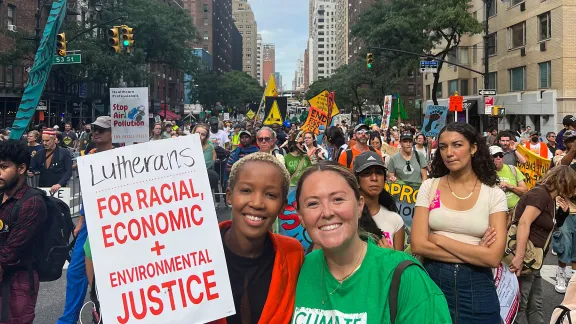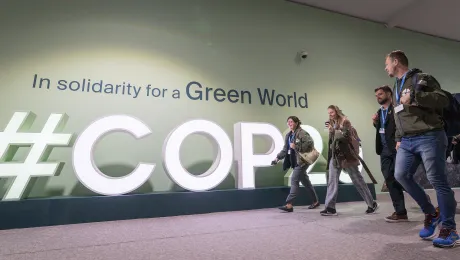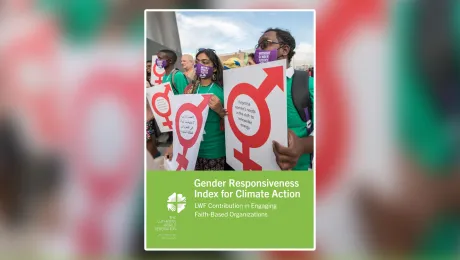Young Adults at the Evangelical Lutheran Church in America offer Lenten reflections and practical suggestions for strengthening environmental protection policies

ELCA/LWF Fellow Naomi Mbise and ELCA Program Director for Environment and Energy Policy Christine Moffett attend a NYC Climate March in 2023. Photo: Lindsey Pajot
In a presidential election year, youth leaders are urging Christians to step up creation care action for Lent
(LWI) - No Plastics for Lent is the name of a campaign that young adults in the Evangelical Lutheran Church in America (ELCA) have been running for the past five years, with the aim of increasing awareness and action around environmental stewardship and the safeguarding of God’s creation.
This year, however, with a presidential election due in the autumn, they are urging Christians “to go one step further,” moving beyond individual actions to considering ways of becoming more effective advocates for environmental and climate justice at local and national level.
“It was the sense of hopelessness, a feeling that I had to change every aspect of my personal life to stop the world burning, that drove me into this advocacy work,” says Christine Moffett, currently serving as ELCA’s program director for environment and energy policy. Growing up in Texas, where Lutherans are a small minority, she says she was inspired by the social teaching of her church, especially in the field of environmental protection.
It is important to reflect on how we can change the system.
Christine Moffett, ELCA program director for environment and energy policy
“As a young person,” Moffett continues, “it was my concern about climate change that motivated me to get more involved in this work. I often speak to others of my generation and across the board I see there is a real desire to talk about this crisis and to do something concrete about protecting our planet.”
As in past years, those interested in joining the Lent campaign are encouraged to take a pledge to try and stop using plastic, much of which ends up polluting the world’s rivers, seas and oceans. “That pledge may look very different, depending on people’s socio-economic or geographical location,” Moffett says. “But we are increasingly aware that the system makes it very challenging for us to eliminate plastic use so it is important to reflect on how we can change the system.”
With this in mind, ELCA’s advocacy team have joined hands with the Young Adults ministry to come up with suggested ways in which people can participate in activities such as signing petitions or writing letters to government officials. “Individuals can still find more sustainable ways of living, for example purchasing power is a form of advocacy, but we also want to shift the focus into making connections that can channel those feelings of frustration and hopelessness,” Moffett insists.
Creation care voting
“With an election on everyone’s minds,” she says, “we also want to take this one step further and provide people with resources to think about what it means to be a creation care voter when they go to the polls in November.” Over the coming weeks, the campaign organizers are providing material ranging from theological reflections and suggested spiritual practices, to practical actions that individuals and congregations can undertake to prioritize environmental justice as an important election issue.
As a former leader of ELCA’s Young Adults Ministry, LWF’s Program Executive for Youth Savanna Sullivan was one of the driving forces behind the original No Plastics for Lent campaign. She says: “The current face of the campaign gives an opportunity to connect the spiritual practices of living sustainably every day with both theological reflection and collective action through advocacy. I’m glad to follow the leadership of young Lutherans in this movement.”
“As people of faith,” Moffett concludes, “we want to bring hope to people this Lent and show that, despite the challenges, it is possible to bring about change.”


